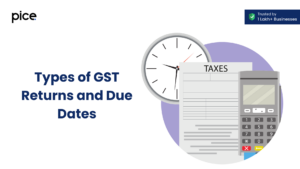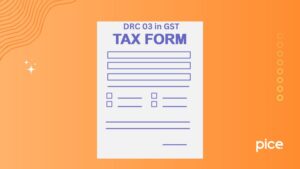Understanding B2BA in GST: What It Means for Your Business
- 17 Aug 24
- 12 mins

Understanding B2BA in GST: What It Means for Your Business
Key Takeaway
- B2BA invoices are crucial for correcting errors and updating transaction details after the original GST invoice has been filed.
- Timely issuance of B2BA invoices ensures compliance with GST regulations and avoids potential penalties.
- Proper filing of B2BA amendments in the GST system requires accurate updating and communication with the transaction recipient.
- Automating B2BA processes through integration with GSTN enhances accuracy and efficiency in GST compliance.
- Avoiding common pitfalls such as delays in amendments and incorrect data linking is vital for maintaining accurate GST records.
What is B2BA in GST?
In the realm of GST (Goods and Services Tax) in India, B2BA stands for a B2B (Business-to-Business) amended invoice. This concept is crucial for businesses engaging in transactions where both the supplier and the recipient are registered under GST. B2BA invoices are issued to correct or modify the details of an original invoice that has already been filed in the GST returns.
The need for an amendment might arise due to various reasons such as errors in the invoice data, changes in tax rates, or alterations in transaction details after the invoice has been issued. Since GST operates on a digital compliance model where every transaction detail is recorded in real time, the accuracy of these details directly impacts tax calculations and compliance status.
Understanding B2BA is essential because it ensures that businesses can rectify discrepancies in their invoicing without compromising their compliance with GST laws. The procedure allows corrections to be made officially and ensures that both parties in the transaction acknowledge and adjust to these corrections in their respective ledgers, preserving the integrity of the financial records and the GST framework itself.

When Do You Need to Issue a B2BA Invoice?
Issuing a B2BA (Business-to-Business Amended) invoice becomes necessary under several specific circumstances within the GST (Goods and Services Tax) framework. Understanding when to issue a B2BA invoice is crucial for maintaining compliance and ensuring the accuracy of your financial records.
1. Correction of Errors
If there are mistakes or inaccuracies in the original invoice such as incorrect GSTIN, wrong billing details, misstated quantities, or erroneous tax amounts, a B2BA invoice is required to correct these errors. This ensures that both businesses reflect the accurate details for their tax liabilities and input tax credit claims.
2. Changes in Tax Rates
At times, tax rates might change due to policy updates between the time of supply and the billing period. If the original invoice was issued with an outdated tax rate, a B2BA invoice must be issued to adjust the tax calculations according to the current rate.
3. Return or Rejection of Goods
If goods are returned or rejected by the buyer after the original invoice has been issued, a B2BA invoice is needed to reverse or adjust the charged amounts and associated taxes. This is particularly important to ensure that inventory and financial records are kept up to date.
4. Alterations in Contractual Terms
Any changes to the terms of the contract that affect the invoiced amount, such as discounts, rebates, or penalties, after the original invoice has been issued would also necessitate the issuance of a B2BA invoice. These amendments must be documented to align the transaction records with the agreed terms.
5. Regulatory or Compliance Updates
Sometimes, legislative or regulatory changes might prompt a need to reissue invoices to comply with the new requirements. This could involve structural changes to the invoice format or additional information that wasn't previously captured.
In all these cases, issuing a B2BA invoice not only helps in keeping financial and tax records straight but also ensures that businesses remain compliant with GST laws. This process is vital for the accurate reporting and transparency required under GST, facilitating smoother audits and financial assessments.
💡If you want to pay your GST with Credit Card, then download Pice Business Payment App. Pice is the one stop app for all paying all your business expenses.
How to Correctly File a B2BA Amendment

Filing a B2BA (Business-to-Business Amended) invoice correctly is essential for maintaining compliance with the Goods and Services Tax (GST) laws in India. It involves updating the original invoice details that have already been submitted in a GST return. Here’s a step-by-step guide on how to correctly file a B2BA amendment:
Step 1: Identify the Need for Amendment
First, identify the specific error or reason for the amendment in the original B2B invoice. This could be due to incorrect details like GSTIN, product descriptions, tax rates, or billing information.
Step 2: Prepare the Amended Invoice
Create an amended invoice that includes all the corrected details. Ensure that the invoice clearly states that it is an amended version and references the original invoice number. Include the corrected details such as the right GSTIN, revised tax amounts, and any other pertinent information that aligns with GST regulations.
Step 3: Input the Details in GSTR-1
Log into the GST portal and navigate to GSTR-1, which is the form for outward supplies. In the GSTR-1 form, locate the section for amendments. Enter the details of the amended invoice in the respective columns, including the original invoice number, the date of the original invoice, and the corrected details. This step ensures that the changes are officially recorded in the GST system.
Step 4: Communicate with the Recipient
Inform the recipient of the goods or services about the amendments made. Provide them with a copy of the amended invoice so they can also make the necessary adjustments in their own records. This communication is crucial for ensuring that both parties’ ledgers reflect the correct transaction details.
Step 5: File the GSTR-1 Form
After entering all the necessary amendments, review the entries to ensure accuracy and completeness. Once verified, submit the GSTR-1 form. This submission updates your tax records and adjusts your tax liability accordingly.
Step 6: Monitor the Changes
After filing, monitor the status of the amendment in the GST portal to ensure that it is processed and accepted. Keep an eye on subsequent GST returns to confirm that the amendments have been incorporated in your overall tax details.
Step 7: Keep Records
Maintain thorough records of the amendment process, including copies of the amended invoice and correspondence with the recipient. This documentation will be invaluable in case of audits or if discrepancies arise in the future.
Common Mistakes to Avoid with B2BA Filings
When handling B2BA (Business-to-Business Amended) invoices under the GST (Goods and Services Tax) system, certain common pitfalls can lead to complications and compliance issues. Avoiding these mistakes is crucial for maintaining accurate records and ensuring smooth tax processes. Here are some typical errors to watch out for:
1. Delay in Filing Amendments
One of the most common errors is the delay in making necessary amendments to invoices. The GST system requires that any amendments to invoices be filed in the GSTR-1 of the month following the month in which the original invoice was issued. Delaying beyond this timeframe can complicate your compliance status and may lead to penalties.
2. Incorrect Linking of Invoices
When filing a B2BA amendment, it is essential to correctly link the amended invoice to the original invoice. Failure to accurately reference the original invoice details can lead to discrepancies in your financial records and misalignments in your GST filings, making audits and reconciliations more difficult.
3. Inaccurate Reporting of Changes
Amendments need to be precise. This includes correctly updating quantities, prices, tax rates, or GSTIN details. Inaccurate reporting in B2BA filings can lead to incorrect tax calculations, which not only affects your financial reporting but can also result in underpaid or overpaid tax liabilities.
4. Failure to Notify Recipients
It's crucial to notify the recipient of the amended invoice as soon as it is issued. The recipient needs this information to make corresponding adjustments in their records, especially for claiming the correct amount of input tax credit. Not communicating changes effectively can disrupt the recipient's compliance and financial reporting.
5. Overlooking Regulatory Updates
GST regulations and rates are subject to change. Companies sometimes overlook these updates when issuing B2BA invoices, which can lead to non-compliance with the current laws. It is important to stay informed about any changes in the GST framework and apply these changes to your invoicing process.
6. Neglecting Document Retention
Proper documentation and retention of all invoices, original and amended, are mandatory under GST law. Businesses often neglect this aspect, which can cause significant issues during audits. Ensure all documents are securely stored and easily accessible for future reference or if the tax authorities request them.
Impact of B2BA on Business Accounting and GST Compliance
The implementation of the B2B Automation (B2BA) in business accounting has had a significant impact on GST compliance, streamlining processes and enhancing efficiency. Here's a detailed examination of its effects:
1. Improved Accuracy and Efficiency
B2BA systems facilitate the automation of key accounting tasks such as data entry, invoicing, and financial reporting. This automation minimizes human errors that can lead to discrepancies in tax calculations and financial records. As a result, businesses experience improved accuracy in their financial documentation, which is crucial for GST compliance.
2. Real-Time Data Processing
B2BA allows for real-time processing and updating of financial transactions. This capability ensures that the GST-related data is always current and reflects the latest business transactions. It aids in timely GST filing and reduces the chances of penalties due to delayed submissions.
3. Enhanced Compliance Tracking
With B2BA, businesses can integrate GST compliance checks into their routine accounting practices. The system can be set up to automatically verify the accuracy of GST calculations and the appropriateness of tax credits claimed. This integration helps businesses remain compliant with GST laws and regulations continuously.
4. Easier Reconciliation
Reconciliation of invoices is a crucial aspect of GST compliance, ensuring that the input tax credits are accurately claimed. B2BA solutions facilitate easier and faster reconciliation of purchase and sales invoices by automatically matching them against each other. This automation reduces the administrative burden and speeds up the reconciliation process.
5. Seamless Integration with GSTN
B2BA systems can be integrated seamlessly with the GST Network (GSTN), allowing for direct communication and data exchange. This integration enables the automatic filing of GST returns, direct uploading of invoices, and instant retrieval of information from the GST portal, which simplifies the compliance process.
6. Better Decision Making
The analytics capabilities of B2BA systems provide businesses with insights into their financial performance, tax obligations, and compliance status. These insights aid in making informed decisions about tax planning, financial management, and strategic business operations.
7. Cost Reduction
By automating many of the routine tasks involved in accounting and GST compliance, B2BA systems help reduce the need for manual labor, thereby cutting down on labor costs and administrative expenses. Over time, this can lead to significant cost savings for businesses.
 By
By 

















